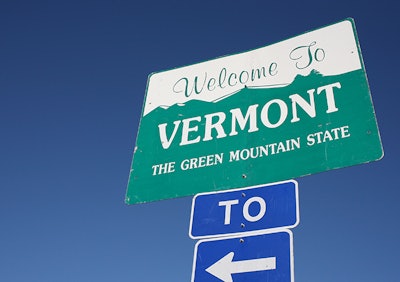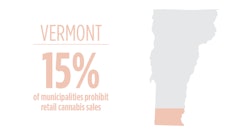
Three Vermont lawmakers stuck their toes in the adult-use cannabis water and introduced a bill that would put an end to jailing non-violent cannabis drug offenders.
H.170, titled “an act relating to possession and cultivation of marijuana by a person 21 years of age or older,” would remove all civil and criminal penalties for possessing up to two ounces of dried marijuana for adults aged 21 or older. It also would permit the home cultivation of two mature marijuana plants and seven immature marijuana plants (defined as non-flowering plants).
One notable absence from the bill: It does not regulate or tax the production or sale of adult-use cannabis.
“We went that route last year, and we got turned down,” said Rep. Thomas Burditt, one of the bill’s sponsors and the Republican assemblyman of West Rutland.
Burditt, a supporter of cannabis legalization, says many Vermonters aren’t ready for a legalized adult-use cannabis program yet. He cites last year’s defeat of a marijuana legalization bill in his own judiciary committee as the reason for proposing a toned-down version.
“I’m a supporter of legalization,” Burditt said, “but the constituents aren’t.” That’s why Burditt voted to killed the 2016 legalization bill in committee despite his personal views, anticipating the bill’s defeat on the full floor.
Rep. Maxine Grad, chairwoman of the Vermont House Judiciary Committee and another one of H.170’s sponsors, told Vermont Public Radio last year that the committee would pursue an alternate plan to further decriminalize cannabis use.
“So this is a way to continue the good work of decriminalization, to provide fairness to people who really can belong in that [decriminalization] system,” said Grad.
Vermont’s decision to stay away from full legalization is a departure from policies enacted by the legislatures of neighboring states: Maine and Massachusetts. Both of those states recently voted on and passed adult-use laws.
Burditt doesn’t fear losing out on potential tax revenue from Vermonters visiting neighboring states to purchase their cannabis products. “You can’t lose what you don’t have,” he said.
The bill also allows for possession of over two ounces if the person is also growing a legal number of plants at home and the surplus product is safely stored at home. “Safely stored” can be broadly defined, according to Burditt, with the intent being that the products cannot be accessed by children.
Attempts to extract cannabis concentrates using butane at home are also strictly prohibited.


























